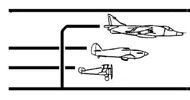| Name: | |
| Doug Shorey | |
| Transcript: 1 | |
| Apprentice Pay | |
Doug joined Hawkers as an apprentice in August 1957, a few months before his 17th birthday. He had been offered an Engineering Apprenticeship but unfortunately did not get the correct number of GCE passes for this grade.He was therefore reclassified as the lower Trade Apprentice. This was reflected in the pay he received and made it more difficult to achieve his goal of gaining Chartered Engineer status.That reminded me actually, when I got my papers, when I first joined Hawkers, it gave what the rates of pay were for each year. And I remember at the age 20 they were going to pay us six pounds, six shillings a week. And when you’re on £1.75 a week – that’s what about £6.30 now – when you’re on £1.75 a week that sounds a lot of money. And of course as you get older you have a greater need for money. And I remember on one occasion we actually – the apprentices went on strike for a couple of days. And that was unheard of actually. I actually… Tell me about that. I actually went into the company when there were strikes – because apprentices couldn’t go on strike. But I was a lot better off than most because I was living at home. But a lot of the boys were living in digs. There were lots of people the company knew that would put up apprentices all through their apprenticeship, in and around the Kingston area. And a lot of the people I was in an apprentice with were living in digs. I remember one of my colleagues was a man called Alan Ditch. He wasn’t one of the group that I worked with but I was very friendly with Alan. I remember him quite well actually. And he lived in digs, I think at New Malden. And he lived in Seaford. His father had been killed in the war, his father was on Halifax bombers – and his father had been killed in the war. ‘Coz he was the same age as me, he was born sort of 1940 and his father had been killed in the war when he was just a lad. And his mother had remarried and he got on very well with his stepfather but they lived at Seaford on south coast. So he would go home on a Friday and come back on a Monday on his motorbike. But he was really struggling because he had the cost of his travel, there was the cost of his digs and he was really struggling. And I think his mother helped him out because a lot of the landladies wouldn’t do washing – so he had to take, you had to bring your washing up and take it back for mum to do at the weekend. So a lot of the apprentices were really struggling. I mean I was quite well off living at home. I was, you know, rich by comparison. I mean we had one chap who had an old Jaguar and he was in such financial trouble he actually started sleeping in the back of his Jaguar, I remember. Because he couldn’t afford digs that’s how bad it was. And the Union, the shop stewards, got to hear about this and they made representations to the company saying that apprentices were having trouble. And that wasn’t just the year I was in – that was all years, across the whole spectrum of the four or five years people were apprentices. And it was the trade apprentices, in particular, that were hard done by because they got paid less than the engineering apprentices. And of course then there were a student apprentices who went to University and for that you had to have ‘A’ levels, which of course I didn’t have. And I remember, I suppose I would have been about probably eighteen or nineteen, we actually did go on strike. My parents were horrified, and we did go on strike for a couple of days actually, and the company… So did you actually do to show you were on strike? We just didn’t go in. And the Union… Did you stand outside the doors? We weren’t allowed to join the union but the union supported us. Yes we did stand outside the gates but we didn’t go in. And of course we didn’t paid, which was another problem. But then after a couple of days we were told to go back in and the company would reconsider. And they did reconsider and they gave us an increase, I can’t remember what it was now, but they did give us an increase. And by the time I went into the Lofting Department – I mentioned ability money, earlier. I never got to sixpence an hour but I managed to get to five pence an hour. And I think had I stayed on the shop floor I would have got the extra penny. Most people got it actually; most people would get it over the four year period. But you didn’t get it if you were in the Drawing Office because it was engineering apprenticeships. And they didn’t get the ability money – so that is why I didn’t get the additional penny. Not that it made a lot of difference but it would have been nice to have it than not have it. |
|


